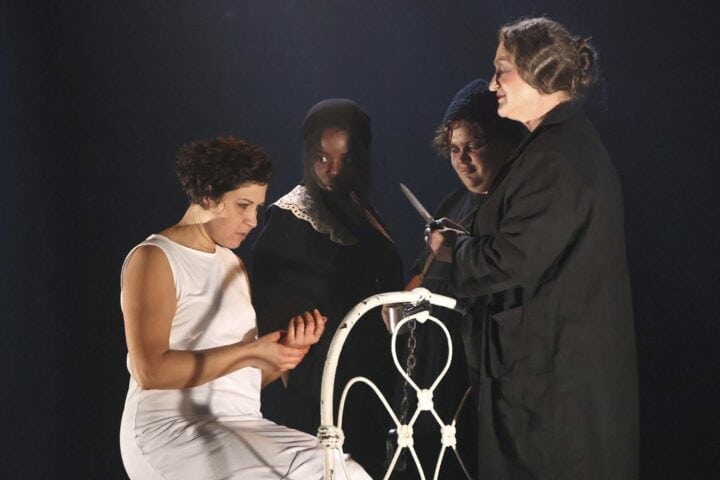“Every word of Irish spoken is a bullet fired for Irish freedom,” says Arlo (Michael Fassbender), a member of the Irish Republican Army who learned Irish Gaelic during a stint in prison, to his son Naoise and the youngster’s best friend, Liam. It’s a phrase that would stick with the pair—who’d go on to become two-thirds of the rap group Kneecap—far more than any of the warnings they’d get from the police, or “peelers” as they unaffectionately call them, as well as members of the paramilitary group Radical Republicans Against Drugs.
Rich Peppiatt’s Kneecap follows cheeky youths from North Ireland whose passion for rapping nearly matches their unabashed hatred of the Brits and their powerful lackeys for oppressing the Irish people and suppressing the use of Irish Gaelic. Despite the verisimilitude the film garners from its risky and ultimately brilliant decision to have Naoise, Liam, and their initially square beatmaster, DJ Provaí, play themselves, Peppiatt’s highly fictionalized origin story of the raucous, transgressive trio thumbs its nose at the conventions of the music biopic. And through its highly kinetic style and relentlessly brash sense of humor, Kneecap brims with a vitality and cheekiness that’s very much in lockstep with the bellicose group’s work and ethos.
Central to Kneecap’s output is their near-exclusive use of Irish Gaelic in their lyrics, which had the unintended side effect of getting them caught up in the growing movement to preserve the language that was banned by the British for years and was only recognized as a language in the U.K. in 2022. An ordinary biopic might use this as an opportunity for its characters to get on their soapboxes and preach about the issue, but Peppiatt isn’t nearly as interested in the moral righteousness of the cause as he is in the unrepentant rage it induced in Kneecap.
Indeed, most of Peppiatt’s film isn’t about respectability, but rather debasement, and sugar-coating Kneecap’s widespread antics isn’t on the menu. From their extensive drug use and run-ins with the peelers to their wild stage antics and various sexual escapades, Kneecap embodies the abrasive resilience commonly associated with Irish and Scottish people.
In one scene, DJ Provaí bends over, exposing an anti-British slogan—“Brits Out”—on his buttocks, while in another scene Naoise draws a connection between the oppression of Blacks in America and the birth of hip-hop and how that drew Kneecap to rap. There’s also an amusingly kinky relationship between Liam and a young, upper-class Protestant girl, Georgia (Jessica Reynolds), in which she peppers him with cultural epithets to make the sex more exciting.
These and other scenes all speak to the clever manner in which Peppiatt infuses his film with a rebellious spirit of cultural pride and class awareness without ever allowing it to become a dominant or suffocating presence. One can even glimpse a Palestinian flag hanging outside one apartment in Kneecap, but all these indications of revolutionary spirit never interfere with the propulsive energy and dynamic sense of fun it seeks to provoke, through both the central performances and a visual style that’s restless and, at times, quite inventive.
In the end, Kneecap stays true to the m.o. of the titular trio, foregrounding their debauchery and cultural resentment, and doing so without preachiness or devolving self-importance. Kneecap isn’t looking to become international arbiters for Irish pride, but they’re a persistent thorn in the side of the British imperialist apparatus and the trio’s tendency to push the boundaries of good taste—and indulge their hedonistic impulses—are part and parcel of their confrontational attitudes toward oppression in whatever form it may manifest itself.
Kneecap bracingly captures the revolutionary spirit of Belfast and a public whose protests aren’t relegated to marches and meetings, but are embodied in the combative, defiant manner in which people conduct themselves in all facets of life. As such, Kneecap is a film that gleefully has its coke and snorts it too, reveling in the ribald exploits of its central trio while slyly presenting that ribaldry as a distinctive form of resistance and rebellion.
Since 2001, we've brought you uncompromising, candid takes on the world of film, music, television, video games, theater, and more. Independently owned and operated publications like Slant have been hit hard in recent years, but we’re committed to keeping our content free and accessible—meaning no paywalls or fees.
If you like what we do, please consider subscribing to our Patreon or making a donation.


